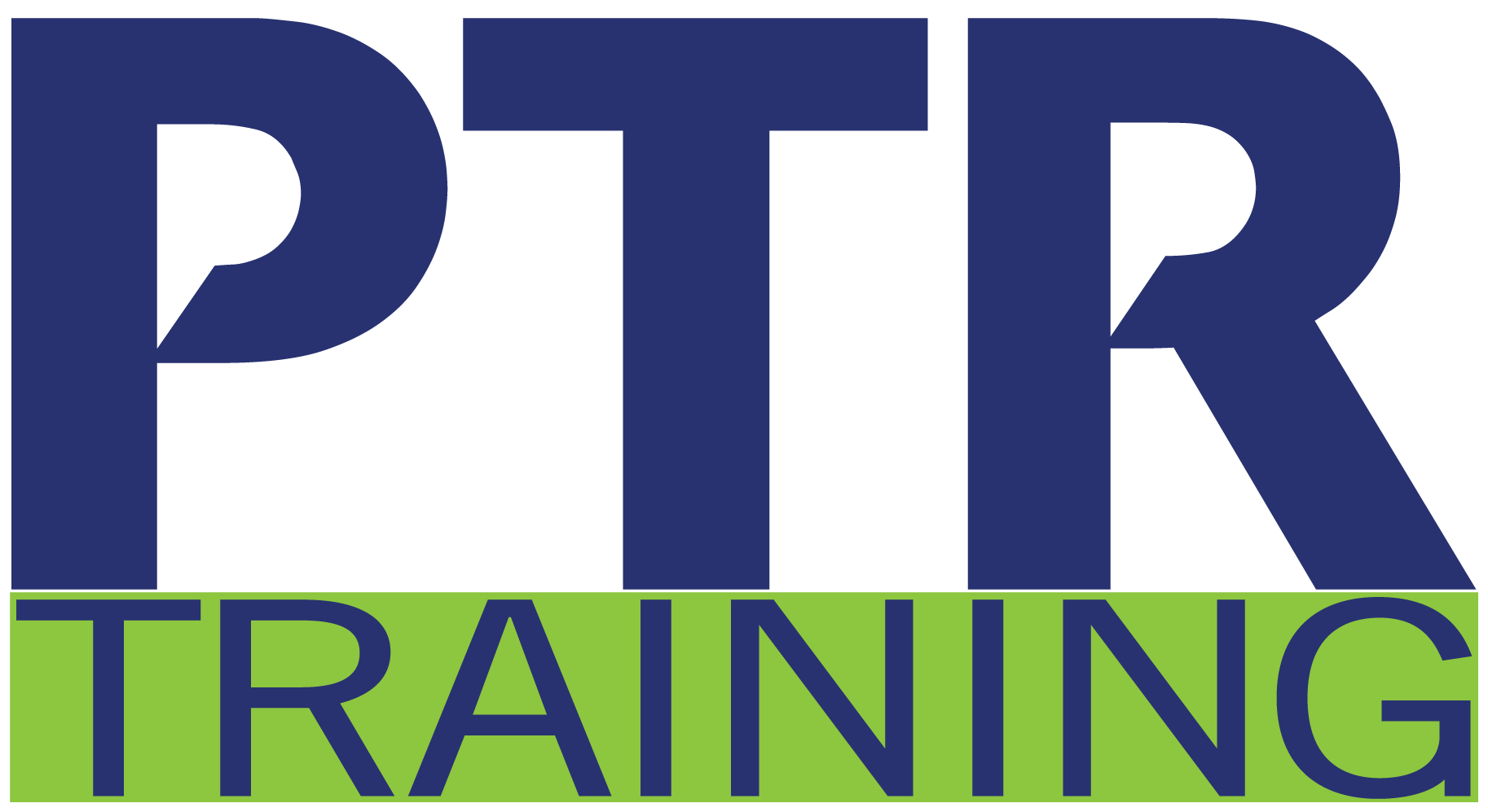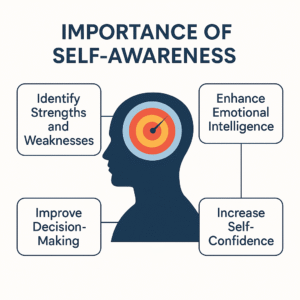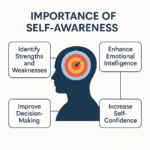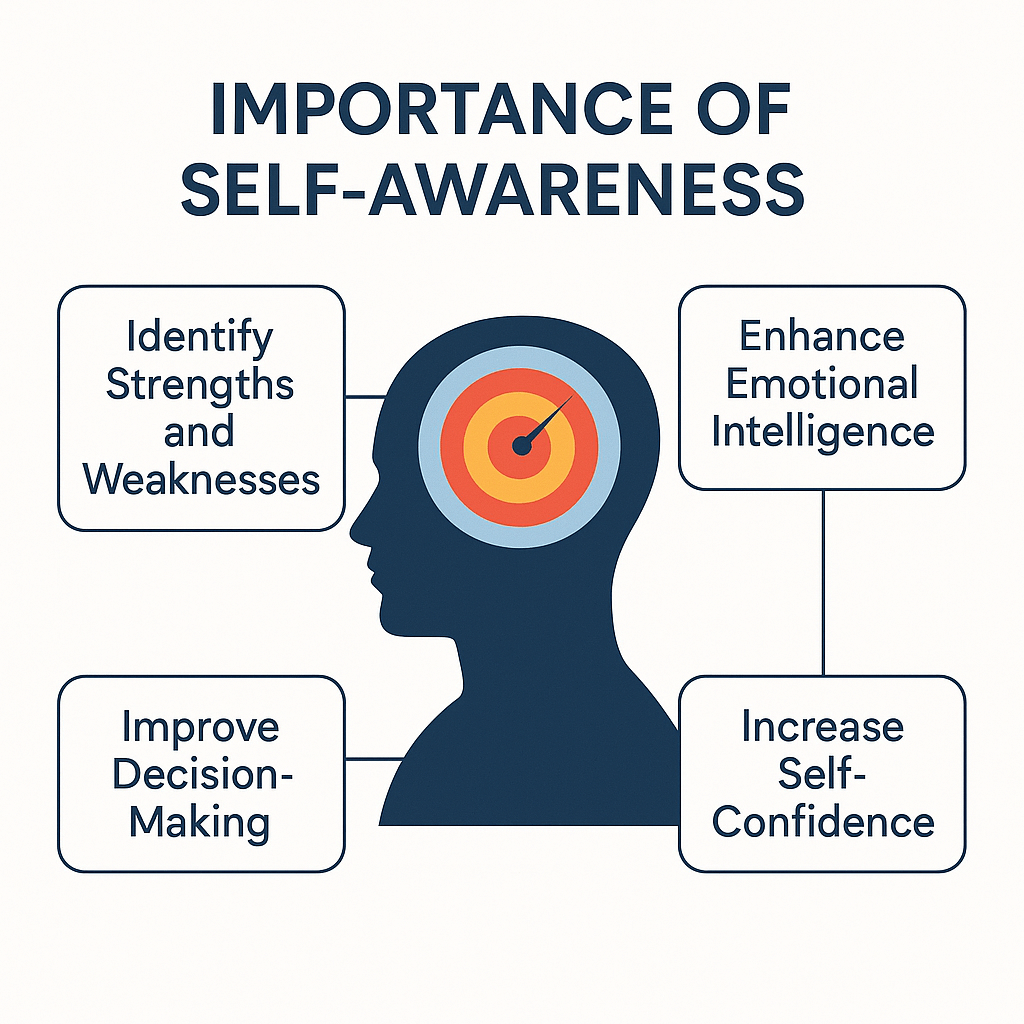
In leadership, the ability to inspire, guide, and influence others does not come only from experience or technical skills. A critical factor that separates exceptional leaders from average ones is self-awareness. Leaders who understand their emotions, strengths, blind spots, and the way they affect others are better equipped to handle challenges, foster collaboration, and build stronger teams.
Yet, research has uncovered a surprising truth: while 95% of people believe they are self-aware, only about 10–15% truly are. This means the vast majority of leaders may not see themselves as clearly as they think. The consequences are significant—leaders who lack self-awareness often struggle with decision-making, conflict resolution, and effective communication. On the other hand, those who prioritize self-awareness not only grow as individuals but also elevate the performance of their teams and organizations.
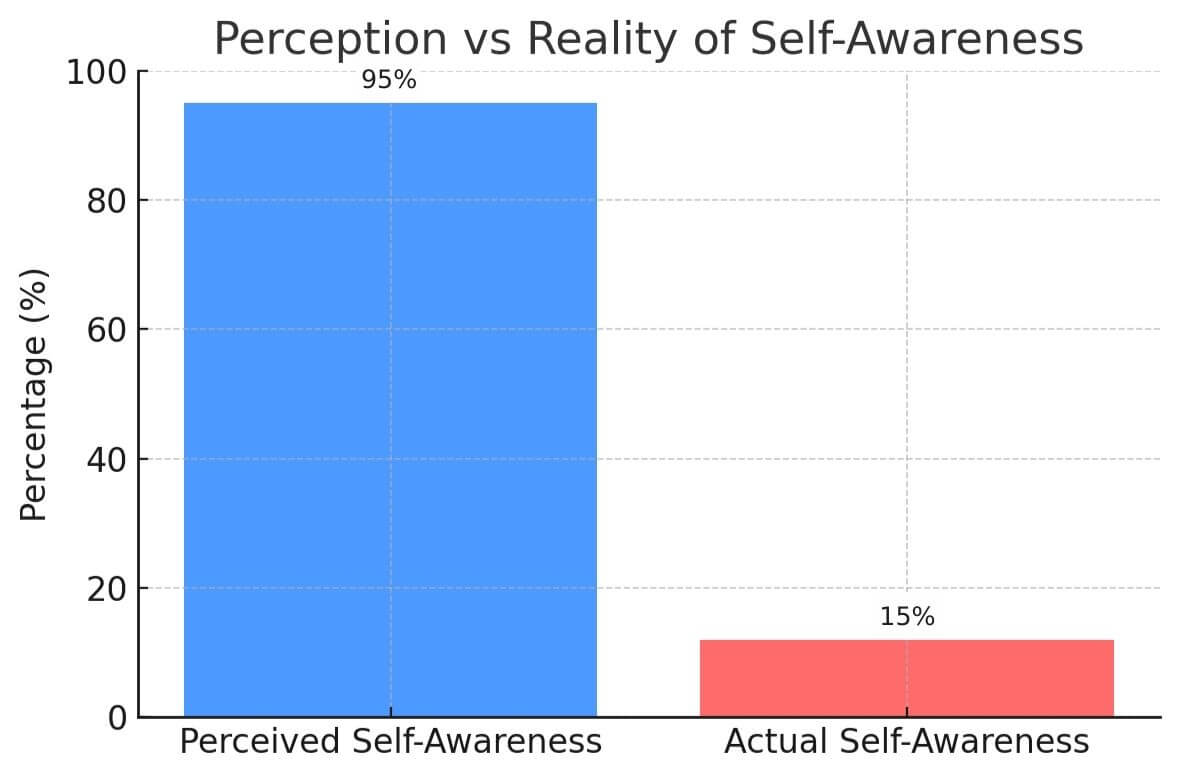
In this post, we’ll explore the importance of self-awareness in leadership development, its benefits, and practical strategies for cultivating it.
What Does Self-Awareness in Leadership Mean?
Self-awareness in leadership is the practice of understanding yourself at a deeper level—knowing your values, emotions, motivations, strengths, weaknesses, and how your behavior impacts those around you. It has two complementary aspects:
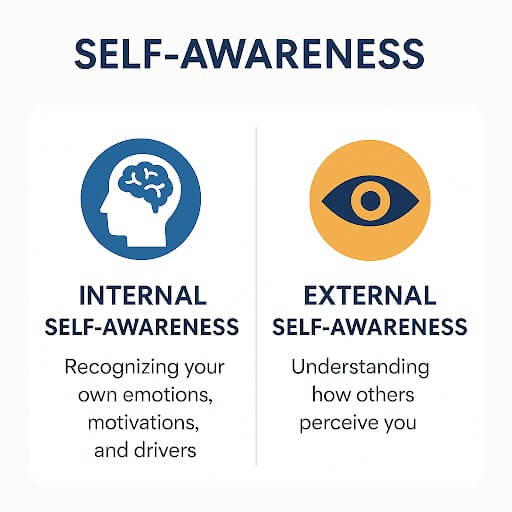
- Internal self-awareness – Recognizing your own emotions, motivations, and drivers. For example, knowing what situations trigger stress or what values guide your decisions.
- External self-awareness – Understanding how others perceive you, and whether their perception aligns with your own. For example, a leader may believe they are approachable, but if employees find them intimidating, there’s a clear gap between self-perception and external perception. Addressing this gap is crucial for authentic and effective leadership.
Leaders with strong self-awareness consistently pause to reflect, ask for feedback, and learn from their actions. Those without it, however, may fall into blind spots—overestimating their abilities or underestimating their weaknesses. In fact, studies show there is less than a 30% correlation between how competent people believe they are and how competent they actually are. This mismatch can hinder personal growth and negatively impact an organization’s performance, which is why leadership and management training courses often emphasize developing self-awareness as a foundation.
Why Self-Awareness Matters in Leadership
Leaders who cultivate self-awareness build a strong foundation for personal growth and organizational success. Its influence extends to nearly every area of leadership:
1. Better Decision-Making
Self-aware leaders recognize when emotions, assumptions, or biases might cloud their judgment. By acknowledging these influences, they can step back and evaluate situations more objectively. This reduces errors and prevents hasty decisions that could harm the team or business.
2. Stronger Collaboration
Teams led by self-aware leaders often experience higher levels of trust and openness. Leaders who understand their impact are less likely to dominate conversations or shut down ideas, creating a culture where collaboration flourishes.
3. Effective Conflict Management
Conflict is inevitable in any workplace. Leaders who lack self-awareness may unintentionally escalate disagreements by reacting defensively or dismissing others’ perspectives. In contrast, self-aware leaders recognize their own triggers, stay composed under pressure, and address conflicts constructively.
4. Authenticity and Trust
Authenticity builds credibility. Leaders who are honest about their strengths and limitations come across as genuine, which earns trust from team members. Employees tend to follow leaders who “walk the talk” and stay consistent with their values.
5. Personal and Organizational Growth
Self-awareness supports continuous learning. Leaders who are aware of their blind spots actively seek feedback and development opportunities. This not only enhances their individual growth but also sets a culture of learning within the organization. Programs such as accountable leadership encourage leaders to recognize blind spots and grow with purpose.
The Business Impact of Self-Awareness
Research by Korn Ferry, analyzing nearly 7,000 self-assessments from professionals across 486 companies, found that employees in poorly performing firms had 20% more blind spots and were 79% more likely to lack self-awareness compared to those in financially strong organizations.
These findings reveal a clear link between leadership self-awareness and business outcomes. Leaders who recognize and address their blind spots not only strengthen their personal effectiveness, but also enhance their performance and resilience. Professional development training often highlights this connection, showing how self-awareness contributes directly to organizational success.
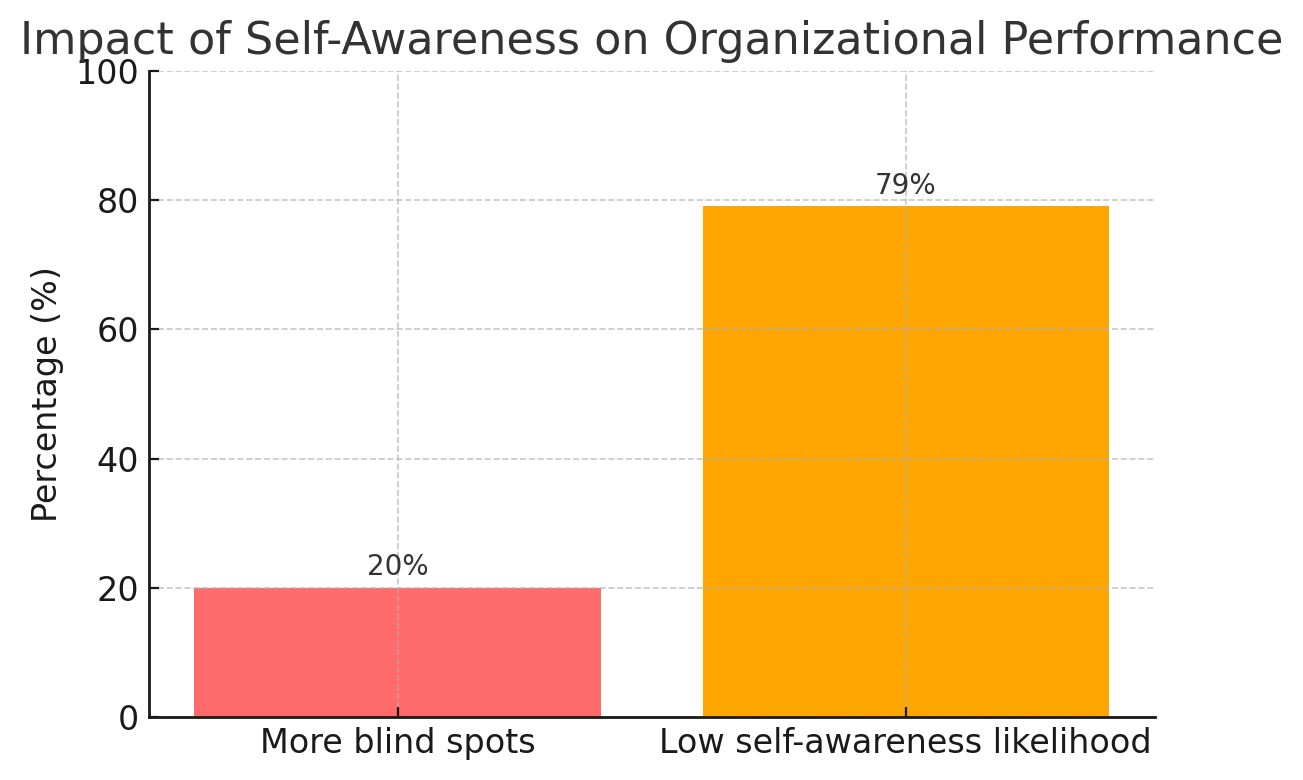
The Benefits of Self-Awareness in Leadership Development
Developing self-awareness unlocks a host of leadership benefits. Some of the key advantages include:
- Better Decision-Making: Self-aware leaders make more informed, less biased decisions. They recognize when personal preferences or emotional reactions might skew their judgment, so they consciously seek data and diverse viewpoints. By “knowing what they don’t know,” these leaders avoid common pitfalls of overconfidence and groupthink.
- Increased Self-Confidence and Resilience: Leaders who truly know their strengths and weaknesses are typically more confident yet humble. They trust their abilities and accept feedback without feeling threatened. This grounded self-confidence makes them more resilient under pressure, as they understand what drains them and how to recover (e.g., taking breaks, delegating when needed). Building resilience course modules specifically nurture this capacity in leaders.
- Authentic Leadership and Trust: High self-awareness leads to authenticity. A self-aware leader acts consistently with their core values and beliefs. Team members sense this integrity; they feel the leader is “real” and aligned internally. That trust invites engagement and loyalty. As one expert notes, “the better a leader’s self-awareness, the truer he/she can be”. In practice, this means employees trust a leader who practices what they preach, which boosts morale and performance.
- Improved Communication and Relationships: Self-aware leaders tend to listen actively and express themselves clearly. They are aware of their communication style and its impact on others, a skill often strengthened through communication training courses. This leads to stronger relationships and collaboration. For example, by recognizing their own emotional triggers, leaders can avoid reactive outbursts and instead respond calmly in tense situations. Employees feel more understood and valued under such leadership.
- Enhanced Emotional Intelligence: Self-awareness is the first step in emotional intelligence (EQ). It allows leaders to recognize their emotions and the underlying needs that drive them, and manage those feelings constructively. As EQ expert Daniel Goleman observes, self-awareness is “the foundation of emotional intelligence.” Leaders with high EQ create positive work environments, motivate their teams effectively, and navigate interpersonal dynamics skilfully.
Stronger Performance and Engagement: A Korn/Ferry study found that organizations with more self-aware employees tend to outperform others financially. This likely reflects the cumulative effects above – better decisions, higher trust, and stronger teams all drive better results. Moreover, when leaders are self-aware, they can tailor their management to each individual (knowing, for instance, who thrives on public recognition vs. who prefers private feedback). This personalized approach increases employee satisfaction, engagement, and retention.
Consequences of Low Self-Awareness
Just as strong self-awareness strengthens leadership, its absence can quietly erode it. Leaders who lack self-awareness often face these pitfalls:
1. Blind Spots and Biases
Without reflection or feedback, leaders often miss harmful patterns, such as micromanaging, interrupting, or overlooking different perspectives, that create blind spots and distort their judgment. Studies show that leaders who think they’re highly self-aware get it right less than 30% of the time in how others perceive them.
2. Erosion of Trust
A mismatch between intent and impact is one of the fastest ways to lose credibility. For instance, a leader who believes they are being decisive may actually come across as dismissive. Over time, this damages authenticity, weakens relationships, and makes team members hesitant to share honest input.
3. Poor Team Dynamics
When leaders fail to recognize how their actions affect others, team culture suffers. Mismanaged conflicts, unacknowledged biases, or emotionally reactive decisions often result in confusion, disengagement, and higher turnover. A study noted that leaders low in self-awareness “negatively impact collaboration, decision-making, and conflict resolution.”
4. Stalled Personal Growth
Leaders who think they “already know themselves” stop seeking feedback or learning opportunities. This stagnation limits both their personal growth and the organization’s potential. Without humility and curiosity, they miss chances to adapt, develop new skills, or evolve with changing circumstances.
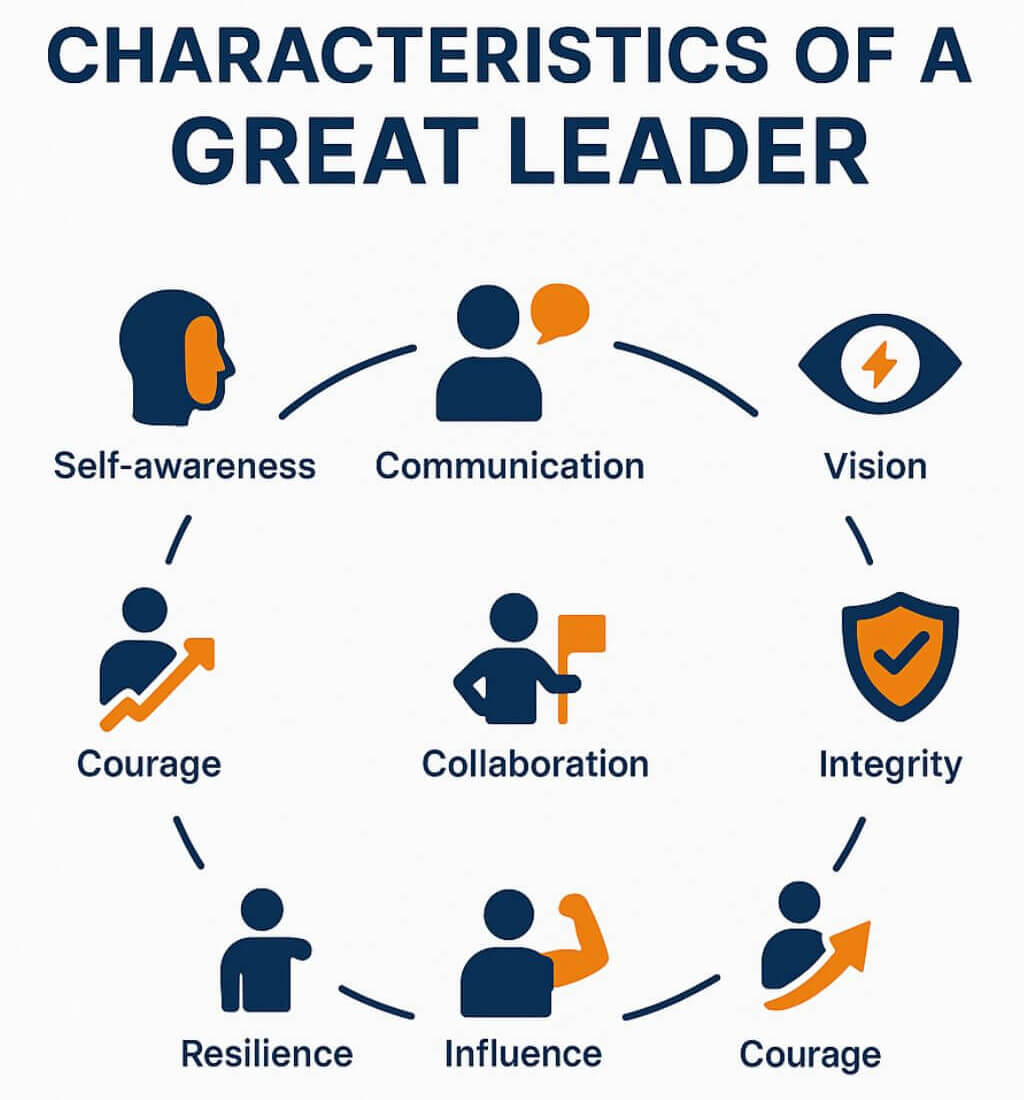
Strategies to Develop Self-Awareness in Leadership
The encouraging reality is that self-awareness isn’t a fixed trait — it can be intentionally developed. Here are proven strategies leaders can adopt:
1. Reflective Practice
Set aside regular time to reflect on your actions, decisions, and interactions. Journaling after significant meetings or projects can help uncover behavioral patterns. Ask questions such as:
How did my actions affect others?
What assumptions did I make? Were they valid?
This habit builds a deeper understanding of both successes and areas for growth.
2. Seek Honest Feedback
Invite constructive feedback from colleagues, mentors, and team members. Tools like 360-degree reviews provide a multi-perspective view that reveals blind spots. When receiving feedback, listen with an open mind, resist being defensive, and ask clarifying questions to fully understand others’ perspectives.
3. Use Personality & Assessment Tools
Structured tools such as MBTI, DiSC, StrengthsFinder, Hogan, or Emotional Intelligence assessments offer valuable insights into your team's personalities, collaboration tendencies, and strengths. While no test defines you completely, these assessments serve as a valuable starting point for deeper reflection when paired with real-world feedback.
4. Practice Mindfulness
Mindfulness helps leaders notice emotions in real time and regulate their responses. Even a few minutes of meditation, breathing exercises, or quiet reflection during the day can enhance present-moment awareness. For example, noticing irritation in a routine meeting can reveal stress triggers and unconscious biases.
5. Apply Cognitive Frameworks
Frameworks such as the Ladder of Inference show how people quickly leap from observing facts to forming conclusions. Leaders who intentionally slow down this process—asking “What assumptions am I adding?”—make more rational, less biased decisions.
6. Work with Mentors or Coaches
Mentors and executive coaches provide accountability and an external perspective. They can highlight gaps between your self-perception and how others actually experience you. For example, a coach might point out: “You believe you’re transparent, but your team feels left out of decisions.” Such guidance accelerates growth.
7. Commit to Lifelong Learning
Self-awareness isn’t a one-time achievement—it’s a continuous journey. Read books or attend workshops on self-awareness and leadership. Learning the science behind self-awareness reminds you of its value and offers new techniques. Committing to personal development signals that you prioritize awareness as much as technical skills.
Leading Starts with Knowing Yourself
Self-awareness is a game-changer in leadership. It drives better communication, more intelligent decisions, and stronger teams—yet only a small percentage of people are truly self-aware. By making time for reflection, feedback, and mentorship, leaders can identify and address blind spots, ultimately building healthier and more effective workplaces.
